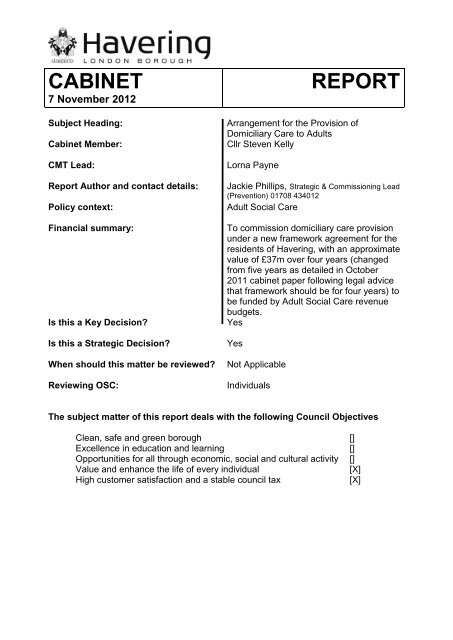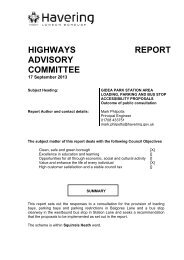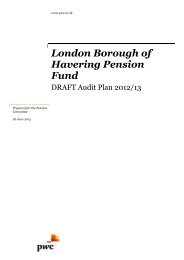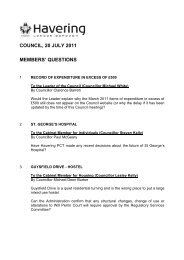Approval for Award of Domiciliary Care Framework Contract PDF ...
Approval for Award of Domiciliary Care Framework Contract PDF ...
Approval for Award of Domiciliary Care Framework Contract PDF ...
Create successful ePaper yourself
Turn your PDF publications into a flip-book with our unique Google optimized e-Paper software.
CABINET<br />
7 November 2012<br />
Subject Heading:<br />
Cabinet Member:<br />
CMT Lead:<br />
Report Author and contact details:<br />
Policy context:<br />
Financial summary:<br />
Is this a Key Decision<br />
REPORT<br />
Arrangement <strong>for</strong> the Provision <strong>of</strong><br />
<strong>Domiciliary</strong> <strong>Care</strong> to Adults<br />
Cllr Steven Kelly<br />
Lorna Payne<br />
Jackie Phillips, Strategic & Commissioning Lead<br />
(Prevention) 01708 434012<br />
Adult Social <strong>Care</strong><br />
To commission domiciliary care provision<br />
under a new framework agreement <strong>for</strong> the<br />
residents <strong>of</strong> Havering, with an approximate<br />
value <strong>of</strong> £37m over four years (changed<br />
from five years as detailed in October<br />
2011 cabinet paper following legal advice<br />
that framework should be <strong>for</strong> four years) to<br />
be funded by Adult Social <strong>Care</strong> revenue<br />
budgets.<br />
Yes<br />
Is this a Strategic Decision<br />
Yes<br />
Yes/No<br />
When should this matter be reviewed<br />
Reviewing OSC:<br />
Not Applicable<br />
Individuals<br />
The subject matter <strong>of</strong> this report deals with the following Council Objectives<br />
Clean, safe and green borough []<br />
Excellence in education and learning []<br />
Opportunities <strong>for</strong> all through economic, social and cultural activity []<br />
Value and enhance the life <strong>of</strong> every individual<br />
[X]<br />
High customer satisfaction and a stable council tax<br />
[X]
Cabinet, 7 November 2012<br />
SUMMARY<br />
This report provides Members with an overview <strong>of</strong> the recently concluded<br />
domiciliary care tender process <strong>for</strong> which the top scoring twelve providers are<br />
being recommended to you, <strong>for</strong> inclusion in the new framework agreement. The<br />
invitation to tender stated that twelve to fifteen providers would be chosen from the<br />
submissions. Following evaluation, the tender panel has recommended awarding<br />
at the lower end <strong>of</strong> the range indicated to tenderers, given the impact <strong>of</strong> personal<br />
budget take up on the size <strong>of</strong> the commissioned homecare market and the need <strong>for</strong><br />
providers to attract enough business to be sustainable.<br />
The new framework agreement will support the delivery <strong>of</strong> the personalisation<br />
agenda within Adult Social <strong>Care</strong> and <strong>of</strong>fer greater control over the resources used<br />
to provide care. The new specification, to which providers will be held accountable,<br />
contains an expectation <strong>of</strong> a truly personalised service. Providers will be expected<br />
to work within enabling methodologies to improve independence and minimise<br />
dependency, thus <strong>of</strong>fering opportunities to minimise cost appropriately.<br />
RECOMMENDATIONS<br />
It is recommended that Cabinet:<br />
1. Approve the 12 providers as listed in Appendix 1 <strong>for</strong> the provision <strong>of</strong><br />
domiciliary care services to adults under a framework agreement with the<br />
Council.<br />
2. To approve the Council entering into a framework agreement with those<br />
providers in relation to the provision <strong>of</strong> domiciliary care services to adults.<br />
3. To approve the Council from time-to-time and as required entering into<br />
service contracts to call-<strong>of</strong>f the services on an individual basis under the<br />
framework agreement.<br />
REPORT DETAIL
Cabinet, 7 November 2012<br />
Current Arrangements<br />
1. The current provision <strong>of</strong> domiciliary care services costs approximately £9<br />
million (rounded) per annum and equates to 720,000 hours (commissioned)<br />
<strong>of</strong> domiciliary provision annually. The current services are commissioned<br />
via an approved list <strong>of</strong> 10 independent/voluntary sector service providers<br />
alongside a range <strong>of</strong> spot purchase agreements to meet specialist needs.<br />
2. An Executive Decision, “Extension <strong>of</strong> <strong>Domiciliary</strong> <strong>Care</strong> <strong>Framework</strong> <strong>Contract</strong><br />
(and resultant 10 individual provider contracts) up to March 31st 2013 to<br />
allow time <strong>for</strong> the approval <strong>of</strong> the award at Cabinet in October and<br />
implementation, <strong>of</strong> a new domiciliary care framework contract” has now<br />
been signed. This will provide a significant transfer period to ensure that<br />
there is no organisational or market destabilisation, where service users will<br />
be given the option <strong>of</strong> staying with their existing provider (should that<br />
provider not be on the new framework) by taking a personal budget through<br />
a direct payment. It is <strong>of</strong> the upmost importance, in a choice and control<br />
market, <strong>for</strong> service users to be able to choose the carer that walks through<br />
their front door, from any CQC registered care provider. For those existing<br />
providers not on the new framework, service users can take a personal<br />
budget to continue to access their services. Should one <strong>of</strong> the unsuccessful<br />
providers, chosen by personal budget holders, be deregistered from CQC,<br />
we would in<strong>for</strong>m the personal budget holders accordingly.<br />
Proposed new arrangements<br />
3. It is proposed that the new framework agreement between the Council and<br />
successful providers will be <strong>for</strong> a period <strong>of</strong> four years to commence probably<br />
by mid January 2013.<br />
4. This new framework agreement proposes the inclusion <strong>of</strong> twelve service<br />
providers as listed in Appendix 1, to ensure choice <strong>for</strong> service recipients and<br />
predictability in the market <strong>for</strong> those providers. The framework agreement<br />
will contain the agreed terms & conditions, including price. The anticipated<br />
total value <strong>of</strong> the new contract over four years is expected to be<br />
approximately £37m.<br />
5. The framework is built on the payment <strong>of</strong> £14.65 <strong>for</strong> each hour <strong>of</strong> domiciliary<br />
care provided, paid on a pro-rata basis. The new framework will be more<br />
equitable than the last banded payment structure. In the banded system, a<br />
provider commissioned <strong>for</strong> a half hour visit, would still be paid <strong>for</strong> the full half<br />
hour, even if the carer was only with the service user <strong>for</strong> 21 minutes (ie<br />
logged into the call monitoring system). The new pro-rata system will<br />
there<strong>for</strong>e ensure the borough will only pay <strong>for</strong> homecare services that have<br />
been delivered. It will however encourage providers to deliver the full<br />
amount <strong>of</strong> time <strong>for</strong> the commissioned service.
Cabinet, 7 November 2012<br />
6. Under the framework agreement, the Council will not give any guarantees or<br />
obligations to procure any services from providers on this framework.<br />
However, where the Council does procure a service the terms, conditions<br />
and service specification as set out in the framework will apply. Individual<br />
care packages will be arranged or „called <strong>of</strong>f‟ from the framework according<br />
to the rules <strong>of</strong> the framework. When a package <strong>of</strong> care is procured from one<br />
<strong>of</strong> the twelve providers, it will be deemed to be a call-<strong>of</strong>f <strong>of</strong> service from the<br />
framework contract.<br />
Procurement Process<br />
7. Tendering <strong>for</strong> the new framework has been carried out in accordance with<br />
the Council‟s <strong>Contract</strong>s Procedure Rules. As this is a Part B service, the full<br />
provisions <strong>of</strong> the Public <strong>Contract</strong>s Regulations 2006 will not apply.<br />
8. The Council adopted a restricted tendering procedure, as a high level <strong>of</strong><br />
interest from prospective bidders was received. The contract opportunity<br />
was advertised in Community <strong>Care</strong> in November 2011. The procurement<br />
followed a two-stage competitive process. The first stage resulted in <strong>for</strong>ty<br />
organisations expressing an interest in submitting a pre qualification<br />
questionnaire (PQQ). However, only thirty seven organisations submitted a<br />
PQQ <strong>for</strong> assessment. Those organisations assessed as meeting the PQQ<br />
requirements were then included on the shortlist <strong>of</strong> twenty seven, which<br />
were successful in reaching the second stage <strong>of</strong> the process, the invitation<br />
to tender. Of the twenty seven shortlisted, twenty four providers submitted<br />
tender documents.<br />
9. The award criterion <strong>for</strong> the tender was based on the quality <strong>of</strong> care that<br />
would be delivered to meet assessed needs, as the price in the contract was<br />
fixed. Providers were asked to demonstrate a range <strong>of</strong> competencies,<br />
including their approach to the safeguarding <strong>of</strong> vulnerable adults, and were<br />
assessed on their responses accordingly. The process was designed to<br />
reward high quality providers to provide real choice to individuals when<br />
deciding which care provider to use.<br />
10. The following <strong>of</strong>ficers are in the project team:<br />
Assistant Director <strong>for</strong> Commissioning (project sponsor)<br />
Manager <strong>for</strong> Modernisation (project manager)<br />
Commissioning Officer (service project team)<br />
Review & Development Officer (service project team)<br />
Strategic Commissioning Lead (Prevention)<br />
(service project team) (Chair <strong>of</strong> tender assessment panel)<br />
Acting Senior Practitioner (service project team)<br />
Quality Manager (service project team)<br />
Project Development Officer (service project team)<br />
Procurement Adviser<br />
Strategic Business Partner (Finance)
Cabinet, 7 November 2012<br />
11. All current and prospective providers were consulted and kept fully engaged<br />
with the tendering process. Providers will be updated on progress by way <strong>of</strong><br />
regular meetings and updates after the cabinet decision has been made, to<br />
ensure a smooth transition from the old contract to the new framework<br />
contract.<br />
Service improvement and best value considerations<br />
12. The new contract will support the improved delivery <strong>of</strong> the personalisation<br />
agenda within Adult Social <strong>Care</strong>, <strong>of</strong>fering greater control over the resources<br />
used to provide care. In particular, this has created the opportunity to<br />
develop a service specification <strong>for</strong> the new contract that is flexible,<br />
innovative and able to support delivery <strong>of</strong> the personalisation agenda. The<br />
specification has been written, following the direction <strong>of</strong> travel as espoused<br />
in Putting People First (2007) and Caring <strong>for</strong> our Future (2012). Providers<br />
will work with service users to develop a plan that will help to achieve<br />
improved outcomes <strong>for</strong> the service user. An example <strong>of</strong> an outcome could<br />
be, if a service user wishes to attend a family outing, support could be<br />
provided to facilitate this. A traditional service would not enable this to<br />
happen only allowing routine personal care tasks to be per<strong>for</strong>med. All care<br />
plans are required to be delivered within available resources according to<br />
assessed need.<br />
13. The tender process was extremely rigorous; putting tenderers to the test on<br />
twenty three questions (some which included up to three parts) about their<br />
ability to deliver flexible, outcome focused and meaningful care to<br />
individuals. The evaluation panel consisted <strong>of</strong> seven members, who each<br />
scored the twenty four submissions. The twelve providers who achieved the<br />
highest scores are recommended to proceed onto the framework, (the lower<br />
end <strong>of</strong> the range <strong>of</strong> providers to be chosen highlighted in the specification).<br />
The decision was influenced by the potential impact on the value <strong>of</strong> the<br />
contract, by service users <strong>of</strong> unsuccessful existing providers opting to take a<br />
personal budget to remain with their current provider.<br />
14. The use <strong>of</strong> an electronic monitoring system, that monitors the arrival and<br />
departure times <strong>of</strong> care staff, will be a contractual obligation placed upon all<br />
suppliers as part <strong>of</strong> their approval <strong>for</strong> the provision <strong>of</strong> domiciliary care within<br />
the new framework agreement. Recording <strong>of</strong> arrival and departure times is<br />
mostly done by utilising the service user‟s home phone to dial in and dial out<br />
using a free phone access number. However, when this is not possible, the<br />
carer uses their own mobile phone to call the <strong>of</strong>fice <strong>for</strong> the details to be<br />
added to the system there. This will ensure continued in<strong>for</strong>mation collection<br />
and financial monitoring <strong>of</strong> the contract. It will also support the safeguarding<br />
<strong>of</strong> vulnerable adults in the care <strong>of</strong> the Borough, as the system will be able to<br />
track and alert <strong>for</strong> any visits that are not made to any service user.<br />
15. It should be noted that, owing to the nature <strong>of</strong> the service and its individual<br />
specific needs, there will, on occasions, be an ongoing requirement <strong>for</strong> the
Cabinet, 7 November 2012<br />
use <strong>of</strong> „spot‟ purchasing <strong>of</strong> care arrangements outside <strong>of</strong> the proposed<br />
framework arrangement where specialist providers are required. However<br />
the service area will endeavour to minimise this need, and straight<strong>for</strong>ward<br />
domiciliary care packages, procured by the Council, will be from the<br />
framework.<br />
16. If Cabinet approves the recommendation, up to 600 users may choose to<br />
stay with an unapproved provider. If so, the only way they could do so would<br />
be via a direct payment and we, as a Council, will advise them that this<br />
would be their choice whilst giving them the in<strong>for</strong>mation as to why their<br />
provider is no longer on the framework contract so they are making an<br />
in<strong>for</strong>med choice.<br />
17. Packages <strong>of</strong> care which are being provided by existing providers, who<br />
subsequently become new framework members, will be subject to the terms<br />
and conditions set out in the new framework.<br />
REASONS AND OPTIONS<br />
Reasons <strong>for</strong> the decision:<br />
1. To ensure the continued delivery <strong>of</strong> domiciliary care to adults in Havering.<br />
2. To make arrangements to ensure the delivery <strong>of</strong> that care under the new<br />
framework from January 2013 onwards.<br />
Other options considered:<br />
1. Do nothing. The current contract arrangements would come to an end and<br />
all future domiciliary care packages would need to be procured on an<br />
individual (spot purchase) basis. This is not a practical option and would<br />
lead to a potential decrease in quality and value <strong>for</strong> money. Furthermore<br />
the vetting and monitoring <strong>of</strong> multiple spot providers on an ongoing basis<br />
would require considerably more resources than monitoring an agreed pool<br />
<strong>of</strong> framework providers.<br />
2. Attempting to extend the current contracts would only <strong>of</strong>fer the Council a<br />
short-term solution and would be in contravention <strong>of</strong> European procurement<br />
rules. The latest executive decision to extend the current arrangements was<br />
taken, to bridge the time until the new framework contract (which was still<br />
being tendered) was in place. The current contracts do not acknowledge<br />
many <strong>of</strong> the legislative changes <strong>of</strong> the past five years, the introduction <strong>of</strong><br />
technologies to better manage the domiciliary process and do not <strong>of</strong>fer the<br />
opportunity to establish real efficiency savings or allow <strong>for</strong> flexibility. All <strong>of</strong>
Cabinet, 7 November 2012<br />
the a<strong>for</strong>ementioned are now seen as essential to deliver on the<br />
personalisation agenda.<br />
IMPLICATIONS AND RISKS<br />
Financial implications and risks:<br />
The 2011/12 actual costs <strong>for</strong> the provision <strong>of</strong> domiciliary care services were in the<br />
region <strong>of</strong> £9.2m, met from the Adult Social <strong>Care</strong> revenue budget. There was also<br />
£0.9m spent on physical disability homecare. Most learning disability provision<br />
rests with specialist providers. The new contract will continue to be funded by<br />
Adults Services.<br />
This tendering process is not expected to generate significant savings, although<br />
some efficiencies will be achieved through use <strong>of</strong> the electronic tracking system<br />
and, going <strong>for</strong>ward, some efficiencies should be possible through better directed<br />
and more enabling packages which decrease dependency.<br />
There is a one <strong>of</strong>f cost implication associated with new providers being required to<br />
use the electronic monitoring system CM2000 (in respect <strong>of</strong> training and set up<br />
costs) which will be in the region <strong>of</strong> £2.6k per new provider. These costs will be<br />
borne by the providers.<br />
The contract will be awarded on a fixed price basis. The price <strong>of</strong> £14.65 per hour<br />
has been arrived at after an analysis <strong>of</strong> existing rates against time delivered. The<br />
new contract will make payments per minute which is projected to generate<br />
efficiencies in that non-productive time will not incur a charge to the Council (nor to<br />
the individual in the case <strong>of</strong> direct payments) ensuring value <strong>for</strong> money. As the<br />
price is fixed, the award <strong>of</strong> the tender is based on quality only, this includes<br />
safeguarding practice.<br />
The contract will be awarded initially <strong>for</strong> four years which is the maximum<br />
permissible term <strong>for</strong> a framework contract under European procurement rules. The<br />
value over the full four year period is currently projected to be some £37m,<br />
although this is expected to reduce as clients move more towards direct payment<br />
(personal budget) arrangements which fall outside the scope <strong>of</strong> the framework.<br />
Although no provision <strong>for</strong> fluctuations to the hourly rate has been assumed, market<br />
conditions will be reviewed each year. The contract will be monitored on an<br />
ongoing basis in terms <strong>of</strong> both quality and cost effectiveness, and also in terms <strong>of</strong><br />
provider financial stability.<br />
Legal implications and risks:<br />
From the in<strong>for</strong>mation supplied from the procurement <strong>of</strong>ficer in charge there is no<br />
reason to believe that the procurement process has not been conducted in
Cabinet, 7 November 2012<br />
accordance with applicable rules and legislation, and assuming the legal<br />
documents are firstly approved by Legal Services there should be minimum risk in<br />
entering into a <strong>Framework</strong> Agreement with the chosen Providers.<br />
With regard to point 15 <strong>of</strong> the Report it is important to note that any „spot<br />
purchasing‟ <strong>of</strong> care arrangements outside <strong>of</strong> the Proposed <strong>Framework</strong> will be<br />
additional procurements <strong>of</strong> services and will need to be the subject <strong>of</strong> separate<br />
decisions based on their value. This is separate to the call-<strong>of</strong>f <strong>of</strong> services<br />
undertaken from time to time in accordance with recommendation 3 <strong>of</strong> this Report<br />
which are anticipated and covered under the procurement <strong>of</strong> the framework<br />
agreement.<br />
Human Resources implications and risks:<br />
There are no direct HR implications or risks affecting the Council‟s employees in<br />
relation to the recommendations made in this report.<br />
Equalities implications and risks:<br />
An Equalities and Impact Assessment has been conducted and has been reviewed<br />
by the SC&L Equality & Diversity Directorate group. The implications and risks are<br />
those as outlined in the background paper “EIA <strong>for</strong> New Dom <strong>Care</strong> <strong>Contract</strong><br />
<strong>Framework</strong> Sept 2012”.<br />
BACKGROUND PAPERS<br />
October 2011 Cabinet Paper “Arrangement <strong>for</strong> the Provision <strong>of</strong> <strong>Domiciliary</strong> <strong>Care</strong> to<br />
Adults”.<br />
F0087834 <strong>Domiciliary</strong> <strong>Care</strong> Tender Invitation documents, (advising <strong>of</strong> <strong>Framework</strong><br />
Commencement mid Jan 2013).<br />
F0087834 Invitation to Tender<br />
<strong>Framework</strong> Agreement <strong>for</strong> <strong>Domiciliary</strong> <strong>Care</strong> Service<br />
Schedule 1 Call <strong>of</strong>f Mechanism <strong>for</strong> <strong>Framework</strong> Agreement <strong>for</strong> <strong>Domiciliary</strong> <strong>Care</strong><br />
Service<br />
Schedule 2 Call <strong>of</strong>f <strong>for</strong>m <strong>for</strong> <strong>Framework</strong> Agreement <strong>for</strong> <strong>Domiciliary</strong> <strong>Care</strong> Service<br />
Schedule 3 <strong>Domiciliary</strong> <strong>Care</strong> Service <strong>Contract</strong> Terms and Conditions <strong>for</strong><br />
<strong>Framework</strong> Agreement<br />
Schedule 7 <strong>Contract</strong> and Per<strong>for</strong>mance Monitoring <strong>Domiciliary</strong> <strong>Care</strong> Service<br />
Schedule 8 Serious Incident Reporting Procedure<br />
F0087834 Specification <strong>Domiciliary</strong> <strong>Care</strong> <strong>Framework</strong><br />
F0087834 Appendices to Specification Final<br />
EIA <strong>for</strong> New Dom <strong>Care</strong> <strong>Contract</strong> <strong>Framework</strong> Sept 2012
Cabinet, 7 November 2012<br />
<br />
Executive Decision, “Extension <strong>of</strong> <strong>Domiciliary</strong> <strong>Care</strong> <strong>Framework</strong> <strong>Contract</strong> (and<br />
resultant 10 individual provider contracts) up to March 31st 2013 to allow time<br />
<strong>for</strong> the approval <strong>of</strong> the award at Cabinet in October and implementation, <strong>of</strong> a<br />
new domiciliary care framework contract”.
Cabinet, 7 November 2012<br />
Appendix 1:<br />
The top scoring 12 Providers that will be selected to join the New <strong>Domiciliary</strong> <strong>Care</strong><br />
<strong>Framework</strong> <strong>Contract</strong> <strong>for</strong> the London Borough <strong>of</strong> Havering are:<br />
Existing Providers within the Borough:<br />
<br />
<br />
<br />
<br />
<br />
<br />
<strong>Care</strong>watch (East London)<br />
AQS Homecare<br />
John Stanley‟s <strong>Care</strong> Agency<br />
Saga Homecare<br />
Westminster Homecare<br />
Lodge <strong>Care</strong> Group<br />
New Providers to the Borough:<br />
<br />
<br />
<br />
<br />
<br />
<br />
<strong>Care</strong> UK<br />
London <strong>Care</strong> Plc<br />
Circle Support<br />
East Living<br />
Mears<br />
<strong>Care</strong> Central
















